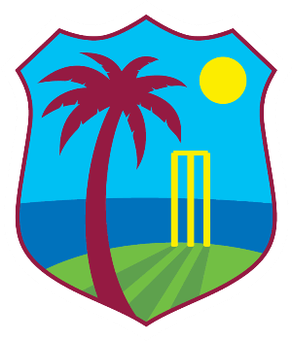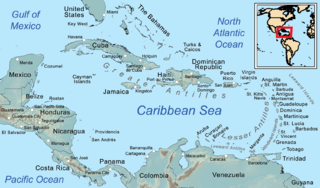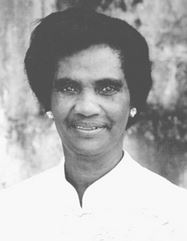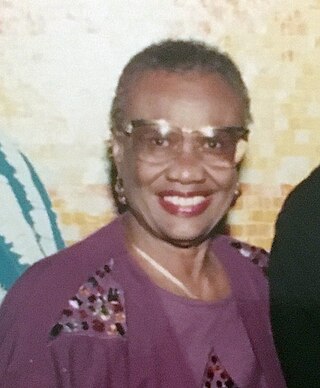Related Research Articles

The Lesser Antilles are a group of islands in the Caribbean Sea. Most of them are part of a long, partially volcanic island arc between the Greater Antilles to the north-west and the continent of South America. The islands of the Lesser Antilles form the eastern boundary of the Caribbean Sea where it meets the Atlantic Ocean. Together, the Lesser Antilles and the Greater Antilles make up the Antilles. The Lesser and Greater Antilles, together with the Lucayan Archipelago, are collectively known as the West Indies.

The British West Indies (BWI) were colonised British territories in the West Indies: Anguilla, the Cayman Islands, Turks and Caicos Islands, Montserrat, the British Virgin Islands, Antigua and Barbuda, The Bahamas, Barbados, Dominica, Grenada, Jamaica, Saint Kitts and Nevis, Saint Lucia, Saint Vincent and the Grenadines, British Guiana and Trinidad and Tobago. Other territories include Bermuda, and the former British Honduras. The colonies were also at the centre of the transatlantic slave trade, around 2.3 million slaves were brought to the British Caribbean. Before the decolonisation period in the later 1950s and 1960s the term was used to include all British colonies in the region as part of the British Empire. Following the independence of most of the territories from the United Kingdom, the term Commonwealth Caribbean is now used.

The University of the West Indies (UWI), originally University College of the West Indies, is a public university system established to serve the higher education needs of the residents of 18 English-speaking countries and territories in the Caribbean: Anguilla, Antigua and Barbuda, The Bahamas, Barbados, Belize, Bermuda, British Virgin Islands, Cayman Islands, Dominica, Grenada, Guyana, Jamaica, Montserrat, Saint Kitts and Nevis, Saint Lucia, Saint Vincent and the Grenadines, Trinidad and Tobago, and Turks and Caicos Islands. Each country is either a member of the Commonwealth of Nations or a British Overseas Territory. The aim of the university is to help "unlock the potential for economic and cultural growth" in the West Indies, thus allowing improved regional autonomy. The university was originally instituted as an independent external college of the University of London.

The Caribbean Examinations Council (CXC) is an examination board in the Caribbean. It was established in 1972 under agreement by the participating governments in the Caribbean Community to conduct such examinations as it may think appropriate and award certificates and diplomas on the results of any such examinations so conducted. The council is empowered to regulate the conduct of any such examinations and prescribe the qualification requirements of candidates and the fees payable by them. It is now an examining body that provides educational certifications in 16 English speaking Commonwealth Caribbean Countries and Territories and has replaced the General Certificate of Education (GCE) examinations used by England and some other members of the Commonwealth. The CXC is an institution of the Caribbean Community (CARICOM); it was recognised as an Associate Institution of the Community in the 1973 treaty that created the Caribbean Community. Members of the council are drawn from the 16 territories and the region's two universities, the University of Guyana and the University of the West Indies.

The term British West Indies refers to the former English and British colonies and the present-day overseas territories of the United Kingdom in the Caribbean.

The British Windward Islands was an administrative grouping of British colonies in the Windward Islands of the West Indies, existing from 1833 until 31 December 1959 and consisting of the islands of Grenada, St Lucia, Saint Vincent, the Grenadines, Barbados, Tobago, and Dominica, previously included in the British Leeward Islands.

Cricket West Indies (CWI) is the governing body for cricket in the West Indies. It was originally formed in the early 1920s as the West Indies Cricket Board of Control, but changed its name to West Indies Cricket Board (WICB) in 1996. In November 2015, the Board resolved to rename itself as Cricket West Indies as part of a restructuring exercise that would also see the creation of a separate commercial body. This rebranding formally occurred in May 2017.
Pupil teacher was a training program in wide use before the twentieth century, as an apprentice system for teachers. With the emergence in the beginning of the nineteenth century of education for the masses, demand for teachers increased. By 1840, it had become evident that the academic preparation of students for teacher training in a college system was inadequate. In 1846, Britain formalized a pupil-teacher system, focusing on training middle-class teachers, in which a senior pupil of at least thirteen years old, served as an apprentice, typically for five years, to learn the teaching profession. Pupil-teachers acted as a teacher of younger children, learning from observation and practical application, while simultaneously completing their own educations.

The Caribbean is a subregion of the Americas that includes the Caribbean Sea and its islands, some of which are surrounded by the Caribbean Sea and some of which border both the Caribbean Sea and the North Atlantic Ocean; the nearby coastal areas on the mainland are often also included in the region. The region is southeast of the Gulf of Mexico and the North American mainland, east of Central America, and north of South America.
Julian Ernest Chetvynde Rogers MBE is a Caribbean broadcaster and journalist. He has worked as broadcast manager, TV and radio host and producer, publisher, trainer, lecturer, media consultant and public relations professional. Involved since the 1970s with the building of national radio stations notably in Barbados, St Kitts & Nevis, and Antigua & Barbuda, and part of "the original team set up to 'revolutionise' the media industry in Trinidad & Tobago with the rebranding of the Trinidad and Tobago Television Company (TTT) into CNMG", he has been called "the Caribbean man" and has established a reputation as one of the region's most respected media practitioners. His characteristic style as a broadcaster is to conduct biting interviews; one commentator refers to "the persistent journalistic exploits of a resurgent, sharp-witted and emphatic Julian Rogers".
Antigua State College is a public tertiary institution in Antigua and Barbuda, with 1,000 students enrolled in several programs. The college consists of several departments such as the Advanced Level, Department of business, engineering, department of undergraduate studies, teacher education (offsite) and school of pharmacy (off-site).
The Hugh Wooding Law School (HWLS) is a law school in Trinidad and Tobago.
Sturge Park was a cricket ground located on five acres of land adjacent to Plymouth, Montserrat. The ground, used by the Montserrat cricket team and infrequently by the Leeward Islands cricket team, was destroyed in the Soufrière Hills volcanic eruption of 1997. A replacement ground, the Salem Oval, was opened in 2000 on the north of the island.

Mary Charles George O.B.E. was a Kittitian educator. She taught school in St. Kitts for 43 years before moving to the Virgin Islands, where she taught for another decade. She was the first woman in St. Kitts and Nevis to run for public office. For her contributions to education in the Caribbean, she was honoured with the Order of the British Empire from Queen Elizabeth II and granted a life membership in the Caribbean Union of Teachers. A hospital in Molyneux, Saint Kitts, and the teaching excellence award of the St. Kitts Teachers’ Union are named in her honour.
Cheryl Pickering-Moore was one of the first two women to fly as a pilot for the Guyana Defence Force and a pioneer aviator in her native Guyana. In 2013, she was recognised in Guyana with a postage stamp issued with her likeness.

Dame Gwendolyn Tonge, DCN, OH, MBE was an Antiguan teacher and home economics expert. After teaching for many years, she became the head of the government Women's Desk, the precursor to the Directorate of Gender Affairs. Appointed as a Senator, she continued to work in the Ministry of the Prime Minister, responsible for policies on women's issues. As Auntie Gwen, she hosted a cooking show Cooking Magic, which began airing on the Antigua and Barbuda Broadcasting Service (ABS) in the 1960s until her death, the longest running television series in the eastern Caribbean, other than news programs. The recipient of many awards, she was honored with the Order of the British Empire, the Order of Honour of Antigua and Barbuda, Distinguished Order of the Nation.
The Samuel Jackman Prescod Institute of Technology is a technical and vocational educational institution located in Pine Hill, Bridgetown, Barbados.
The Erdiston Teachers' Training College is located in Pine Hill, Bridgetown, Barbados. It is affiliated with the School of Education of the University of the West Indies, Cave Hill Campus.

University of the West Indies at Cave Hill is a public research university in Cave Hill, Barbados. It is one of five general campuses in the University of the West Indies system.
The University of the West Indies Open Campus (UWIOC) is a public and distance only, research university headquartered Cave Hill, Barbados. It is one of 5 general autonomous units of the University of the West Indies system. Its main campus is located inside the University of the West Indies at Cave Hill, but remains a distinct and separate institution.
References
Citations
- ↑ Fergus 2003, p. 89.
- 1 2 3 Kirton-Roberts 2015, p. 121.
- ↑ Wright 1989, p. 245.
- ↑ Wright 1989, pp. 93–94.
- ↑ Bacchus 1994, p. 182.
- ↑ Bacchus 1994, pp. 137–139.
- 1 2 Fergus 2003, p. 90.
- ↑ Jarvis 2007.
- ↑ Kirton-Roberts 2015, p. 128.
- ↑ Fergus 2003, p. 40.
- ↑ Kirton-Roberts 2015, p. 130.
- 1 2 Kirton-Roberts 2015, p. 127.
- 1 2 Kirton-Roberts 2015, p. 129.
- ↑ Kirton-Roberts 2015, pp. 129–130.
- ↑ Kirton-Roberts 2015, p. 132.
- ↑ Fergus 2003, pp. 89–90.
- ↑ Taylor & Case 2013, p. 596.
- ↑ Samuel 2007, p. 21.
- 1 2 Taylor & Case 2013, p. 605.
- ↑ Fergus 2003, p. 115.
- ↑ Fergus 2003, p. 62.
- ↑ Fergus 2003, pp. 92–93.
- ↑ Fergus 2003, pp. 174–175.
- 1 2 Fergus 2003, p. 196.
- ↑ The Daily Observer 2010.
- ↑ Fergus 2003, p. 188.
- 1 2 Samuel 2007, p. 22.
- 1 2 Wright 1989, p. 249.
- ↑ Kirton-Roberts 2015, p. 122.
Bibliography
- Bacchus, M. Kazim (1994). Education as and for Legitimacy: Developments in West Indian Education Between 1846 and 1895. Waterloo, Ontario, Canada: Wilfrid Laurier University Press. ISBN 978-0-88920-231-3.
- Fergus, Howard A. (2003). A History of Education in the British Leeward Islands, 1838-1945. Kingston, Jamaica: University of the West Indies Press. ISBN 978-976-640-131-3.
- Jarvis, Cortroy (25 February 2007). "What was their Strategy for Mission?". Moravians. St. John’s, Antigua: The Moravian Church Eastern West Indies Province. Archived from the original on 24 September 2015. Retrieved 6 January 2017.
- Kirton-Roberts, Winelle J. (2015). Created in Their Image: Evangelical Protestantism in Antigua and Barbados, 1834-1914. Bloomington, Indiana: AuthorHouse. ISBN 978-1-5049-0099-7.
- Samuel, Hewlester A. (2007). The Birth of the Village of Liberta, Antigua. Coral Springs, Florida: Llumina Press. ISBN 978-1-59526-725-2.
- Taylor, Patrick; Case, Frederick I. (2013). The Encyclopedia of Caribbean Religions: Volume. Vol. 1: A - L. Urbana, Illinois: University of Illinois Press. ISBN 978-0-252-09433-0.
- Wright, John Alexander (June 1989). The Development of Teacher Education in the Caribbean, with Special Reference to Antigua, Grenada and the United States Virgin Islands (PDF) (Ph.D.). Kingston upon Hull, England: University of Hull – via Core, UK.
- "Whose responsibility?". The Daily Observer. St. John’s, Antigua. 11 February 2010. Archived from the original on 8 January 2017. Retrieved 8 January 2017.